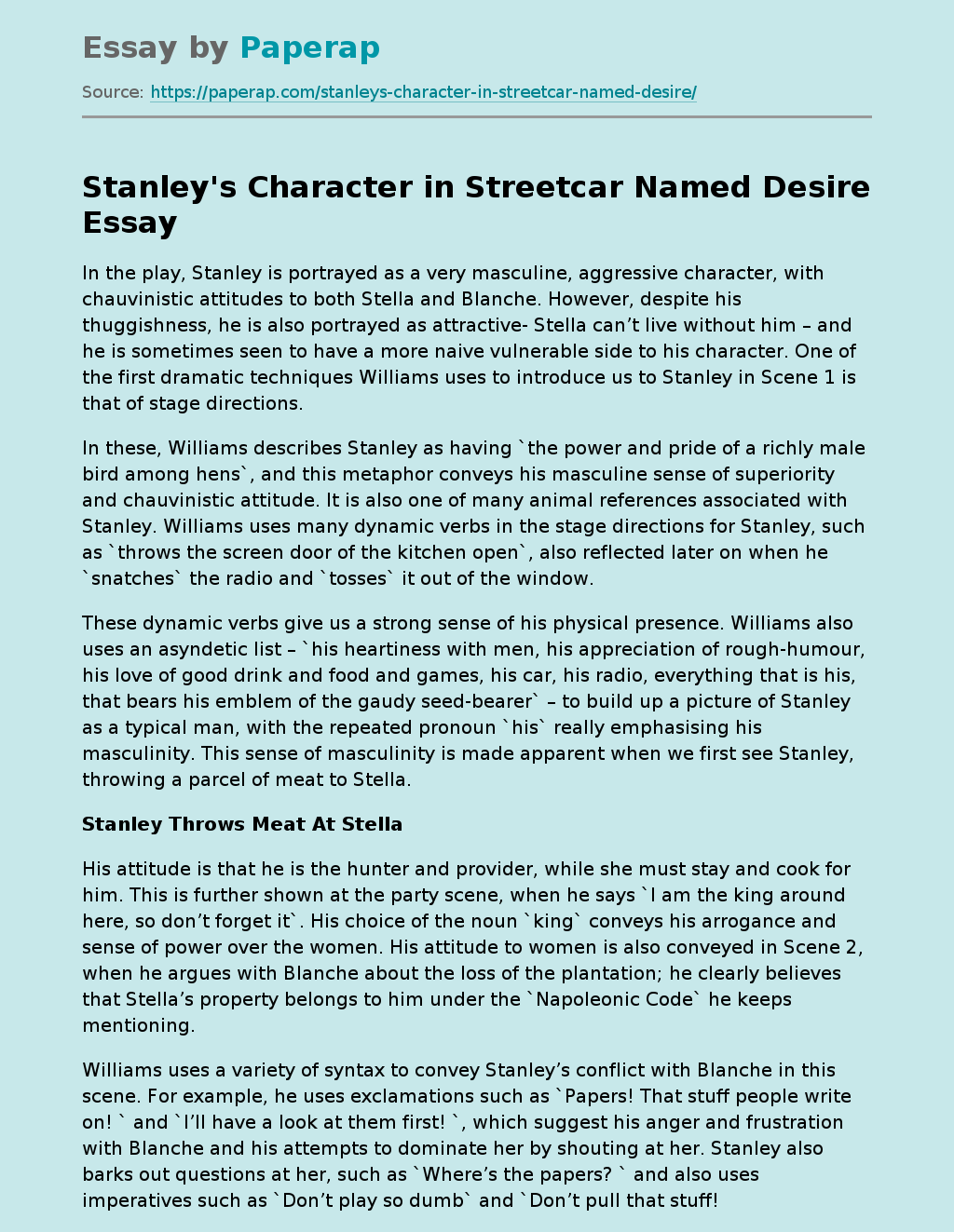Stanley's Character in Streetcar Named Desire
In the play, Stanley is portrayed as a very masculine, aggressive character, with chauvinistic attitudes to both Stella and Blanche. However, despite his thuggishness, he is also portrayed as attractive- Stella can’t live without him – and he is sometimes seen to have a more naive vulnerable side to his character. One of the first dramatic techniques Williams uses to introduce us to Stanley in Scene 1 is that of stage directions.
In these, Williams describes Stanley as having `the power and pride of a richly male bird among hens`, and this metaphor conveys his masculine sense of superiority and chauvinistic attitude.
It is also one of many animal references associated with Stanley. Williams uses many dynamic verbs in the stage directions for Stanley, such as `throws the screen door of the kitchen open`, also reflected later on when he `snatches` the radio and `tosses` it out of the window.
These dynamic verbs give us a strong sense of his physical presence.
Williams also uses an asyndetic list – `his heartiness with men, his appreciation of rough-humour, his love of good drink and food and games, his car, his radio, everything that is his, that bears his emblem of the gaudy seed-bearer` – to build up a picture of Stanley as a typical man, with the repeated pronoun `his` really emphasising his masculinity. This sense of masculinity is made apparent when we first see Stanley, throwing a parcel of meat to Stella.
Stanley Throws Meat At Stella
His attitude is that he is the hunter and provider, while she must stay and cook for him.
This is further shown at the party scene, when he says `I am the king around here, so don’t forget it`. His choice of the noun `king` conveys his arrogance and sense of power over the women. His attitude to women is also conveyed in Scene 2, when he argues with Blanche about the loss of the plantation; he clearly believes that Stella’s property belongs to him under the `Napoleonic Code` he keeps mentioning.
Williams uses a variety of syntax to convey Stanley’s conflict with Blanche in this scene. For example, he uses exclamations such as `Papers! That stuff people write on! ` and `I’ll have a look at them first! `, which suggest his anger and frustration with Blanche and his attempts to dominate her by shouting at her. Stanley also barks out questions at her, such as `Where’s the papers? ` and also uses imperatives such as `Don’t play so dumb` and `Don’t pull that stuff! `, again to control and dominate the scene.
In addition, Stanley’s use of non-standard English and colloquial expressions here give us an impression of an unsophisticated, insensitive man. Stanley’s aggressive character develops further in Scene 3 with the poker game, culminating in him hitting Stella. Here, as in the rape scene later on, Williams uses the dramatic technique of having the actual action off-stage – we only hear `the sound of a blow`, which makes it all the more sinister for the audience as we are not quite sure what has happened. However, Stanley is almost immediately remorseful.
Williams describes him with the simile `like a baying hound`, which is another example of the animal imagery surrounding Stanley, as he calls for Stella. Stanley calls her `my baby`, `my baby doll`, `my girl`. Here the repeated pronoun `my` suggests his possessive feelings for Stella, whereas the noun choices show us his sentimental affection for her. When he is described as `he falls on his knees`, we perhaps see a more vulnerable side to him. Stanley’s violence towards Stella foreshadows the rape scene in Scene 10, which is the climax of the play.
This scene shows Stanley’s cruelty, as he is described as `grinning`. His dominance is shown in his use of short simple imperatives such as `Drop the bottle-top! Drop it! ` When he refers to Blanche as `tiger – tiger! ` he seems to be mocking her and he describes what is happening to the noun `date`, which is cruel and sarcastic. However, just before this episode, when Stanley has arrived home from the hospital, he is shown as exuberantly happy at the thought of the baby coming.
The simile of him waving his red silk pyjamas `like a flag` to celebrate gives a rather simple, naive, child-like image of Stanley. We also see this different side when he talks to Stella about their sex life with the simple metaphor `them coloured lights`. His non-grammatical use of `them` shows us a simple, perhaps uneducated man. In conclusion, Stanley is no doubt a bullying thug, some of whose actions will appeal the audience. However, there are some more appealing aspects to his character, making him a complex character to analyse.
Stanley's Character in Streetcar Named Desire. (2019, Dec 05). Retrieved from https://paperap.com/stanleys-character-in-streetcar-named-desire/

